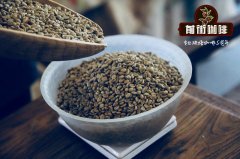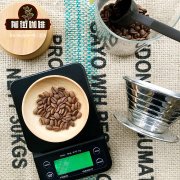It turns out that coffee beans contain not only caffeine, but also caffeinol.
Professional coffee knowledge exchange more coffee bean information please follow the coffee workshop (Wechat official account cafe_style)

Caffeine is a substance found in coffee beans. The amount of caffeine in coffee varies greatly depending on how it is processed and cooked. Humans are still studying this chemical, but it is known to have many properties that have attracted the attention of scientists and doctors. Arabica Coffee (Arabica) and Robusta Coffee Bean (Robusta) are two typical examples of caffeine.
Caffeine alcohol is a diterpene compound in coffee. Caffeine and caffeinol can be separated from coffee beans in oil, which are fat-soluble substances of diterpenes. The only difference between them is that coffee bean alcohol has an extra double bond.
Caffeine is high in unfiltered coffee, such as Turkish coffee, but it is so low in filtered coffee that it is almost negligible.
This substance is a diterpene molecular structure, which means that it belongs to terpene hydrocarbons. Terpenes tend to have strong odors, flavors and essential oils, and residual caffeine is one of the substances that make coffee slightly oily and bitter. This concentrate in Arabica coffee accounts for about 0.6% of the total weight. Robusta coffee, which contains more caffeine than Arabica coffee, also contains caffeine alcohol.
Caffeine is more effective than caffeinol in raising serum cholesterol, and the mixture of caffeine (60 mg / day) and caffeinol (51 mg / day) is only slightly higher than pure caffeine (64 mg / day). Because coffee bean alcohol is difficult to purify and the stability of this diterpene is not good, the effect of pure coffee bean alcohol on improving serum cholesterol is unknown.
Both substances can be extracted by hot water but remain on the filter paper. This explains why Nordic boiled coffee, Turkish coffee and French compressed coffee contain relatively high levels of caffeinol l and caffeinol (6-12 mg / cup), while filtered coffee and instant coffee contain small amounts of caffeol and caffeinol (0.2-0.6 mg / cup). Although the content of diterpene is relatively high in espresso brewed under steam pressure, it is only a secondary source of caffeol and caffeinol (4 mg / cup) because of its low consumption.
Both caffeine and caffeinol have effects on a range of enzymes in the liver. However, its mechanism and effect on human health are not clear.
Important Notice :
前街咖啡 FrontStreet Coffee has moved to new addredd:
FrontStreet Coffee Address: 315,Donghua East Road,GuangZhou
Tel:020 38364473
- Prev

What's the flavor of elephant beans? Why is it as big as beans?
Professional coffee knowledge exchange more coffee bean information please pay attention to the coffee workshop (Wechat official account cafe_style) there are many varieties of coffee beans, we often see, one side is flat, there is a crack above, this is the two seeds in the coffee fruit side, this kind of normal beans we call it flat beans; some coffee fruits contain only one seed, it alone occupies the whole coffee
- Next

Besides Kopi Luwak, there is another shit-like coffee.
Professional coffee knowledge exchange more coffee bean information please follow the coffee workshop (Wechat official account cafe_style) people know such a thing as Kopi Luwak, but do you know there is another kind of coffee that looks like shit? It tastes different from cat shit and normal coffee. Kopi Luwak was once popular all over the world and the price was high, but because the natural output was too low, vendors grabbed it.
Related
- Can lightly roasted coffee beans be used to extract espresso? How finely should you grind high-quality coffee beans to make Italian latte?
- What is the difference between the world's top rose summer coffee and Yejia Shefi? What are the flavor characteristics of Yega Shefi coffee and Panama rose summer?
- The ceremony is full! Starbucks starts to cut the ribbon at a complimentary coffee station?!
- A whole Michelin meal?! Lucky launches the new "Small Butter Apple Crispy Latte"
- Three tips for adjusting espresso on rainy days! Quickly find the right water temperature, powder, and grinding ratio for espresso!
- How much hot water does it take to brew hanging ear coffee? How does it taste best? Can hot water from the water dispenser be used to make ear drip coffee?
- What grade does Jamaica Blue Mountain No. 1 coffee belong to and how to drink it better? What is the highest grade of Blue Mountain coffee for coffee aristocrats?
- What are the flavor characteristics of the world-famous coffee Blue Mountain No. 1 Golden Mantelin? What are the characteristics of deep-roasted bitter coffee?
- Can I make coffee a second time in an Italian hand-brewed mocha pot? Why can't coffee be brewed several times like tea leaves?
- Hand-brewed coffee flows with a knife and a tornado. How to brew it? What is the proportion of grinding water and water temperature divided into?

